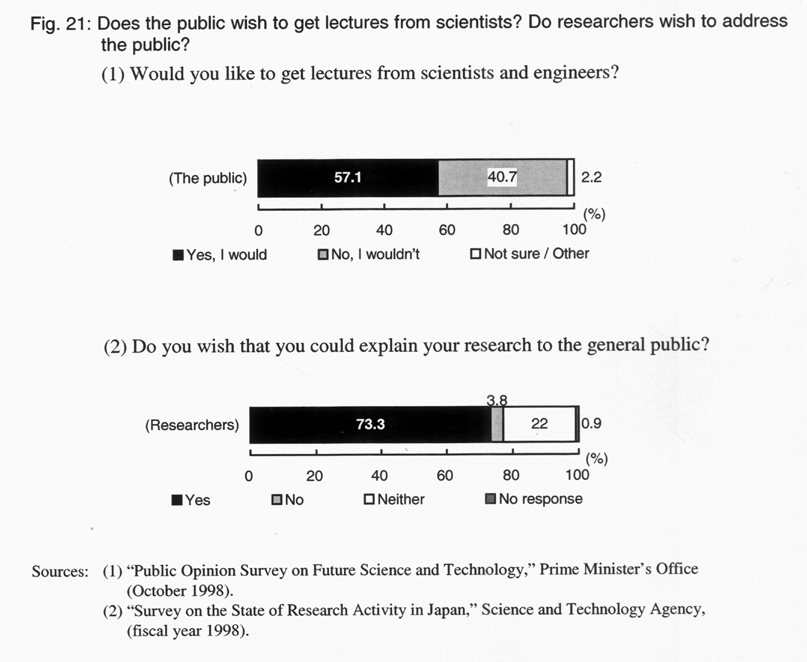| Home > Policy > White Paper, Notice, Announcement > White Paper > Annual Report on the Promotion of Science and Technology 1999 > Part1 Chapter3 Section3 3 | ||
![]() This entails enabling individual members of the general public
to think about and make rational judgments about science and technology.
This entails enabling individual members of the general public
to think about and make rational judgments about science and technology.
![]() Individuals must now consider how to use science and technology
to achieve their own goals, and to judge which of an increasingly diverse range
of options is optimum for them. As in the case of organ transplants from brain-dead
donors, ethics and values are sometimes a major factor in making judgments concerning
such choices.
Individuals must now consider how to use science and technology
to achieve their own goals, and to judge which of an increasingly diverse range
of options is optimum for them. As in the case of organ transplants from brain-dead
donors, ethics and values are sometimes a major factor in making judgments concerning
such choices.
![]() Thus, with respect to science and technology, individuals
require the ability to decide whether or not to use a given technology after
considering not just various scientific and technological details but also the
various benefits of application, the ethical and values-related implications,
and even the social and environmental effects.
Thus, with respect to science and technology, individuals
require the ability to decide whether or not to use a given technology after
considering not just various scientific and technological details but also the
various benefits of application, the ethical and values-related implications,
and even the social and environmental effects.
![]() In efforts to promote understanding, it is important to provide
objective, easy-to-understand information so that individuals can have a basis
for making such judgments. This entails not just a one-sided flow of information,
but rather a process in which public reaction is monitored and in which both
sides think together. In short, it is hoped that individuals, rather than simply
waiting for information and acting passively, will seek out information and actively
express their opinions.
In efforts to promote understanding, it is important to provide
objective, easy-to-understand information so that individuals can have a basis
for making such judgments. This entails not just a one-sided flow of information,
but rather a process in which public reaction is monitored and in which both
sides think together. In short, it is hoped that individuals, rather than simply
waiting for information and acting passively, will seek out information and actively
express their opinions.
![]() In addition, public interest in hearing what scientists and
engineers have to say is increasing: approximately 57% say they would like to
hear discussions by scientists and engineers. Furthermore, over 70% of researchers
say that they want the public to understand their research ( Fig.
21 ).
In addition, public interest in hearing what scientists and
engineers have to say is increasing: approximately 57% say they would like to
hear discussions by scientists and engineers. Furthermore, over 70% of researchers
say that they want the public to understand their research ( Fig.
21 ).

![]() Researchers have the ability to convey the excitement of research
as a career and the atmosphere of research workplaces. In this respect, it is
vital for them to be known thoroughly by addressing the public. Still fresh in
everyone's memory is that over 140,000 responses were received in response with
Astronaut Chiaki Mukai's call for a second verse of Japanese traditional poem
(Tanka) to complete the one she read during a broadcast from the Space Shuttle
Discovery.
Researchers have the ability to convey the excitement of research
as a career and the atmosphere of research workplaces. In this respect, it is
vital for them to be known thoroughly by addressing the public. Still fresh in
everyone's memory is that over 140,000 responses were received in response with
Astronaut Chiaki Mukai's call for a second verse of Japanese traditional poem
(Tanka) to complete the one she read during a broadcast from the Space Shuttle
Discovery.
![]() By addressing the public, researchers can establish two-way
communications through which they can directly determine what the world expects
of science and technology. Such knowledge is certain to provide ideas for new
research.
By addressing the public, researchers can establish two-way
communications through which they can directly determine what the world expects
of science and technology. Such knowledge is certain to provide ideas for new
research.
| Back to Top | MEXT HOME |